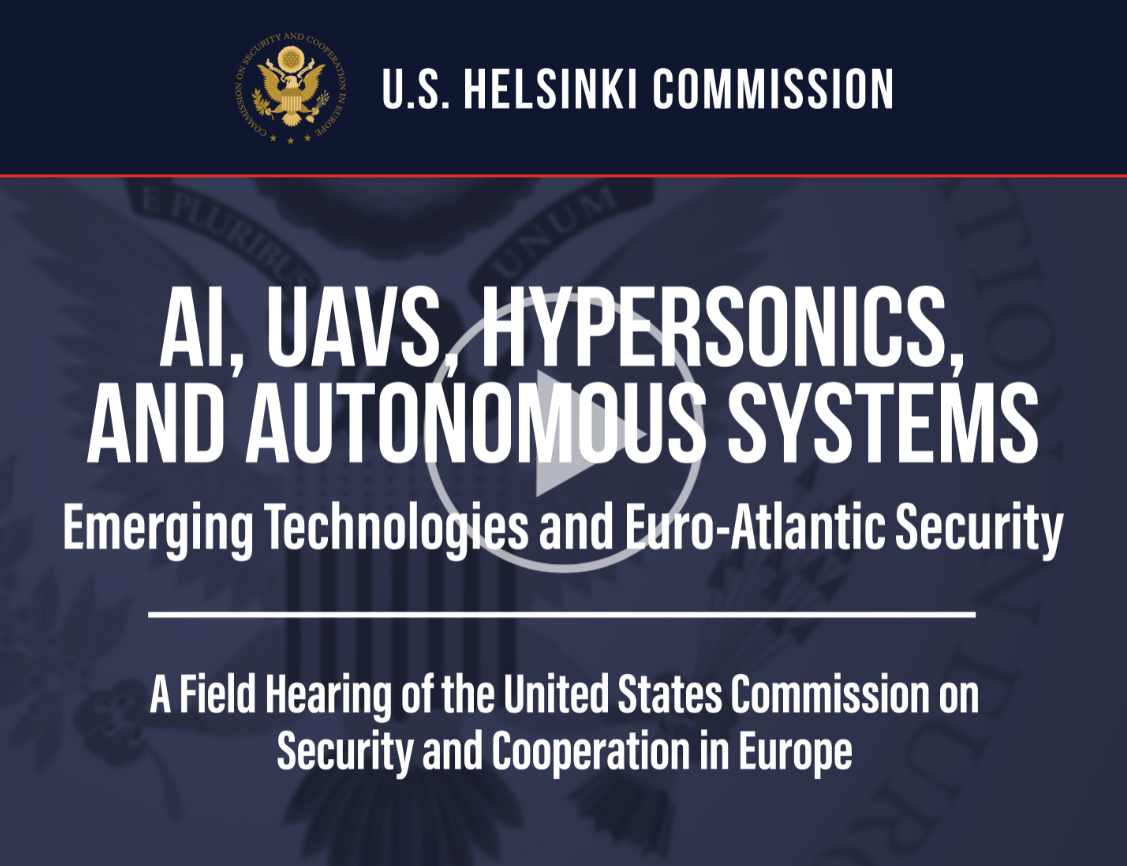If you reach a login page when attempting to view the video, please hit the “back” button and try the link again.
On January 22, 2019, the Helsinki Commission held a field hearing on the development of emerging technologies and transatlantic security at the University of Texas at Arlington. Helsinki Commissioner Rep. Marc Veasey (TX-33) convened the hearing, where two additional members of Congress and expert witnesses discussed the policy, legal, and ethical implications of rapidly changing defense developments.
“New threats that we are concerned with range from hypersonic weapons to drones to autonomous weapons platforms, artificial intelligence, directed energy and others,” Rep. Veasey said. “These technologies have the potential to unlock some very important capabilities in the defense of our homeland and support our allies and friends abroad. However, these same technologies [are] under development from some of our strategic competitors, Russia chief among them.”
Alongside Rep. Veasey, Rep. Colin Allred (TX-33) and Rep. Ron Wright (TX-06) were joined by Executive Director at the Clements Center for National Security William Inboden, Congressional Research Service Advanced Technology and Global Security Analyst Kelley Sayler, and Southern Methodist University Criminal Clinic Director Chris Jenks to discuss the potential for these technologies to threaten security and home and abroad.
Rep. Allred, who serves on the House Foreign Affairs Committee, stressed the importance of considering the legal and ethical dilemmas that the development of new technologies present to the United States. Rep. Allred hoped that the U.S. can strike a balance between maintaining security readiness and American values.
“Obviously we are in a moment in which there is conflict popping up around the world and we have a complicated threat stream that we are trying to look to,” Rep. Allred said. “But as we turn to the great power competition as we have seen emerging now as the focus of our own foreign policy and of our own strategic opponents, I think it is important that we look at these emerging technologies and how this is going to impact it.”
Sayler provided an overview of three major emerging technologies: artificial intelligence, lethal autonomous weapons, and hypersonics. She discussed the potential capabilities of all three technologies; their current state of development in the United States, China, and Russia; and the role of international and regional institutions in governing their use. Sayler also offered predictions for how technology will shape future wars between states, including accelerating the pace of conflict, replacing humans with AI, and shifting the offensive-defensive balance.
Inboden elaborated on the idea of hybrid warfare and shifting strategies with the example of the 2007 cyberattack on Estonia by Russia, which shut down the country’s banking system, media, hospitals, and government.
“From our vantage point 13 years later, I think we should look back on Russia’s cyber attack on Estonia and see it for what it was: the first wave in what would become a cascade of Russian aggression and hybrid warfare,” Inboden said.
Inboden further illustrated the changing nature of conflict by highlighting Russia’s annexation of Crimea and interference in the 2016 election. He also noted that Russia is the OSCE participating State most involved in researching, developing, and employing emerging weapons systems.
Inboden’s recommendations moving forward included combining “strength with diplomacy” and continuing the development of emerging technologies within the United States and other OSCE democracies.
The final witness to testify, Jenks urged the U.S. Congress to direct change within the military to increase understanding of how to set boundaries on scientific development and military operation conduct in the future. Jenks also pointed out that while moral panic might accompany the idea of using new technology on the battlefield, these capabilities may also serve to better protect servicemembers.
“In my view there can be no question that the U.S. and our European allies must continue to leverage emerging technologies and weapons systems – we would be derelict in our duties if we didn’t,” Jenks said. “But we need to halt the demonization of technologization in the context of weapons.”
The members of Congress asked the experts about the potential threat of new technology to advance great power conflict, the ethical and human rights considerations when discussing the implications of efficient technology, and how to use diplomacy to negotiate with strategic adversaries.
“These topics and many others that are discussed are really now, more than ever, need to be something that the American public takes a closer look at,” Rep. Veasey said.




